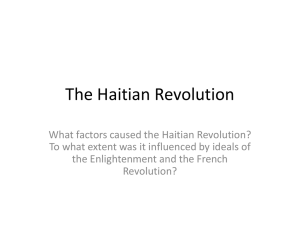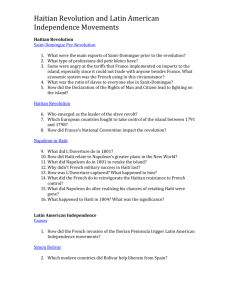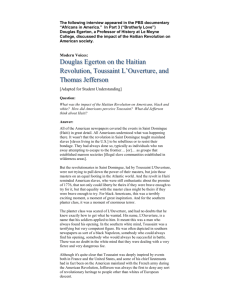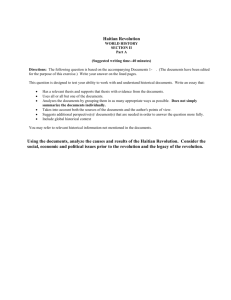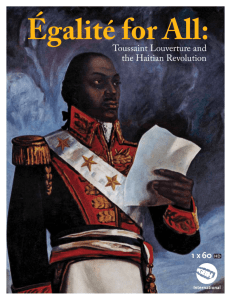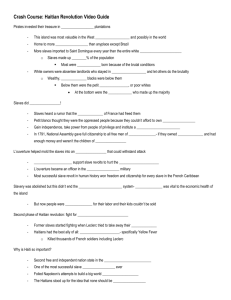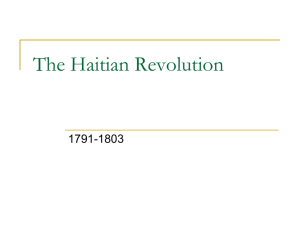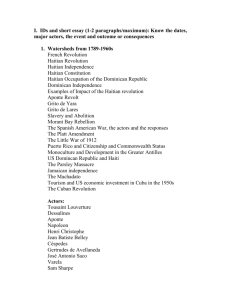Complete Haitian Revolution Investigation, to be collected Friday
advertisement
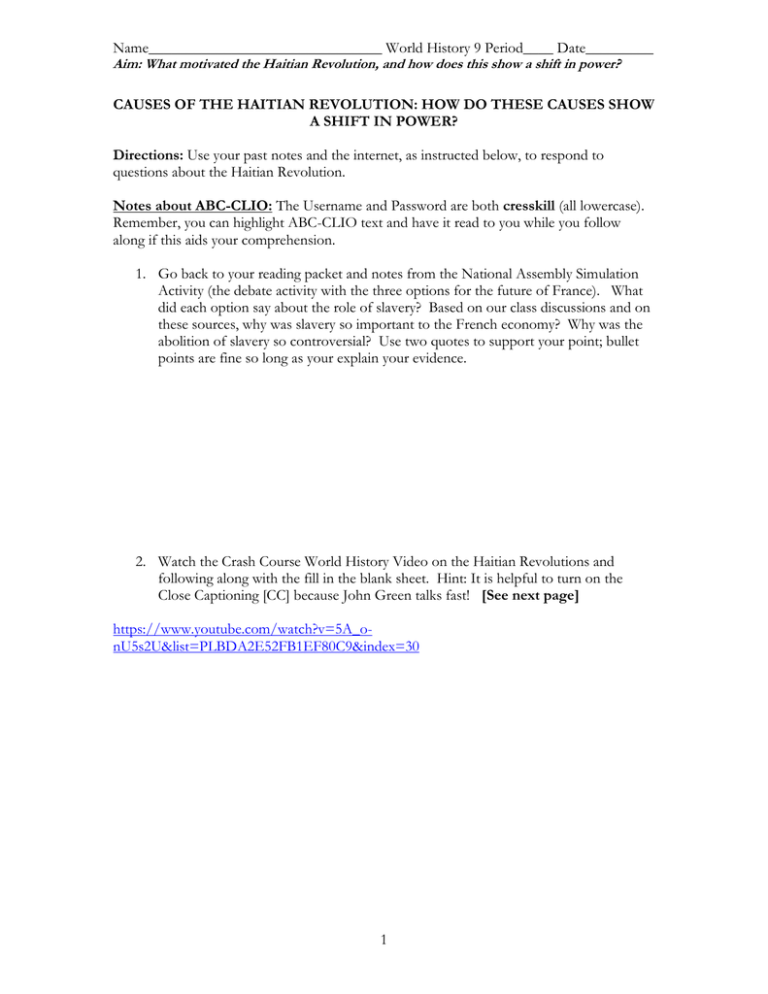
Name_______________________________ World History 9 Period____ Date_________ Aim: What motivated the Haitian Revolution, and how does this show a shift in power? CAUSES OF THE HAITIAN REVOLUTION: HOW DO THESE CAUSES SHOW A SHIFT IN POWER? Directions: Use your past notes and the internet, as instructed below, to respond to questions about the Haitian Revolution. Notes about ABC-CLIO: The Username and Password are both cresskill (all lowercase). Remember, you can highlight ABC-CLIO text and have it read to you while you follow along if this aids your comprehension. 1. Go back to your reading packet and notes from the National Assembly Simulation Activity (the debate activity with the three options for the future of France). What did each option say about the role of slavery? Based on our class discussions and on these sources, why was slavery so important to the French economy? Why was the abolition of slavery so controversial? Use two quotes to support your point; bullet points are fine so long as your explain your evidence. 2. Watch the Crash Course World History Video on the Haitian Revolutions and following along with the fill in the blank sheet. Hint: It is helpful to turn on the Close Captioning [CC] because John Green talks fast! [See next page] https://www.youtube.com/watch?v=5A_onU5s2U&list=PLBDA2E52FB1EF80C9&index=30 1 Name_______________________________ World History 9 Period____ Date_________ Aim: What motivated the Haitian Revolution, and how does this show a shift in power? Crash Course World History Video Notes: The Haitian Revolution 1. The _____________ colony in Saint Domingue began in the 17th century as a pirate outpost. Its original French inhabitants made their living selling leather and a kind of smoked beef called boucan. 2. After 1640, the boucan-sellers started to run low on beef and turned to robbing Spanish galleons which as you’ll recall were loaded with _____________mined from South America. 3. By the middle of the 17th century, many of them invested some of their pirate treasure in _____________ and soon this island was the most valuable colony in the West Indies. 4. It produced 40% of Europe’s sugar, 60% of its coffee, and it was home to more _____________ than any place except Brazil. 5. By the 19th century, slaves made up about _______ of the population. Most of those slaves were African born, because the brutal living and working conditions prevented natural population growth. 6. Colonial society in Saint Domingue was divided into four groups, which had important consequences for the revolution. a. At the top, were the Big White planters who owned the plantations and all the slaves. Often these _____________ _____________were absentee landlords who would just rather stay in France and let their agents do the actual brutality. b. Below them were the wealthy free people of color; mostly the off-spring of Frenchmen and slave women. These free people of color contributed a lot to the island’s _____________. They served in the _____________, and in the local constabulary, and many of the wealthier ones eventually owned _____________ and slaves of their own. c. Next on the social ladder were the poor whites, or the _____________ _____________, who worked as artisans and laborers. d. At the bottom were the _____________ who made up the overwhelming majority. 7. When the _____________ Revolution broke out in 1789, all these groups had something to complain about. The slaves, obviously, disliked being slaves. The free people of color were still subject to legal _____________, no matter how wealthy they became. And the poor whites were resentful of all the privileges held by the wealthy people of color. The Grand Blancs were complaining about French _____________ laws and the government’s attempts to slightly improve the living and working conditions of slaves. 8. The unrest in what became Haiti started in 1789 when word of the changes in France reached the people of Haiti, where The Declaration of Rights of _____________ ____ _____________, while terrifying to planters, gave hope both to free people of color and to slaves. The petit blanc identified with the _____________ estate in France; And they began lobbying for colonial _____________. Then in 1791, these radical petit blancs seized the city of Port au Prince. 9. Meanwhile, urges toward _____________, fraternity, and _____________ were only growing in France and the National Assembly gave full French citizenship to all free men of color. 10. The petit blancs weren’t thrilled about this, and that led to fighting breaking out between them and the newly French free people of color. By August of 1791, a massive _____________ revolt broke out. 11. Among the leaders of this revolt was Toussaint Breda, a former slave of full African descent, who later took the name Toussaint L’Ouverture. L’Ouverture helped mold the slaves into a _____________ army that could withstand attacks from the French troops. 2 Name_______________________________ World History 9 Period____ Date_________ Aim: What motivated the Haitian Revolution, and how does this show a shift in power? 12. The _____________ had consistently supported slave revolts in Saint Domingue hoping to weaken the French. But, by 1793 they were offering even more support. In fact, L’Ouverture became an officer in the Spanish military because the emancipation of the slaves was more important to him than maintaining his rights as a French Citizen. 13. In October of 1793 the _____________, who were also at war with France, decided to invade Saint Domingue. The French military commanders were convinced they would lose the war if fought the British, the Spanish, and the slaves, so let’s free the slaves. The National Convention in Paris ratified those decrees. 14. Having learned of the Convention’s actions, _____________ switched allegiances to the French and turned the tide of the war. Thus, the most successful slave revolt in human history won freedom and citizenship for every slave in the French Caribbean. 15. Between 1794 and 1802, he successfully steered the colony toward independence. So, although slavery was abolished, this didn’t end the _____________ system because both L’Ouverture and his compatriot Andre Rigaud believed that sugar was vital to the economic health of the island. 16. But soon, L’Ouverture and Rigaud came into conflict leading to a _____________ _____________, which L’Ouverture, with the help of his able lieutenant Jacques Dessailines, was able to win after 13 months of hard fighting. 17. L’Ouverture then passed a new constitution, and things were going pretty well on Saint Domingue with the small problem that it was still technically part of France, which meant that it was about to be ruled by _____________Bonaparte. 18. In 1799, Napoleon seized power in France in a coup and established a new constitution that specifically pointed out its laws did not apply to France’s overseas colonies. Napoleon had plans to reconstruct France’s empire in North America that it had lost most of in the _____________ _____________ _____________, and to do this he needed tons of money from France’s most valuable colony, Saint Domingue. 19. Napoleon then reinstated slavery; this started the second phase of the Haitian revolution, the fight for independence. 20. Leclerc (Napoleon’s brother-inlaw) tried to take away the guns of the former slaves, thus beginning a _____________ war that the French, despite their superior training and weapons, had absolutely no chance of winning. 21. The Haitians had the best ally of all: _____________, specifically in the form of Yellow Fever, which killed thousands of French soldiers, including Leclerc himself. 22. So continued defeat and the death of his troops eventually convinced Napoleon to give up his dreams of an American empire and cut his losses. And then, he sold Thomas Jefferson _____________. 23. On January 1, 1804, Dessaillines who had defeated the French, declared the island of Saint Domingue independent and renamed it _____________, which is what the island had been called by the native inhabitants before the arrival of Columbus. 3 Name_______________________________ World History 9 Period____ Date_________ Aim: What motivated the Haitian Revolution, and how does this show a shift in power? 3. Read the biography of Toussaint L’Ouveture (too-SONT loh-vah-CHOOR) of the Haitian Revolution. http://worldhistory.abcclio.com/Search/Display/317609?terms=haitian+revolution Using the text, answer the following: A) How would you describe L’Ouverture’s background? Why was it important to his eventual involvement in the Haitian Revolution? B) List the three major social groups of Haiti, and describe each’s place in society. Then, compare it to the populations demographics chart on the next page (the reasons the numbers are slightly different from the reading on ABC-CLIO is because exact figures are unknown because of inaccurate or lost records, leading to estimates). Social Group: Place in society: Answer: how does this social, economic, and racial make-up help explain what motivated the Haitian Revolution? 4 Name_______________________________ World History 9 Period____ Date_________ Aim: What motivated the Haitian Revolution, and how does this show a shift in power? Source: Demographics of St. Domingue [Haiti], 1789-1790, compiled by the George Mason University Department of History Free Whites Free People of Slaves Color Population Breakdowns Total=560,000 32,000 28,000 500,000 % of Population 6 5 89 Growth (%/year) 1.35 4.5 6 Racial Make-up (%) White Black Mulatto Other [90] est. 0 [10] 0 [15] est. 35 50 0 0 [94] [5] [1] Sex Ratios (%) Men Women 80 20 45 55 60 40 75 25 [5] [95] 67 33 Origins (%) Immigrant Native to St. Domingue C) Why do you think L’Ouverture wanted Saint Domingue to remain part of France (use the text!)? Why do you think he eventually moved toward wanting Haitian independence? 5 Name_______________________________ World History 9 Period____ Date_________ Aim: What motivated the Haitian Revolution, and how does this show a shift in power? 4. Read and analyze the document below. Source: Toussaint L’Ouverture, Letter To The Directory, 1797 Under the French Republic, when Robespierre and the National Convention were in charge of France, slavery had been abolished. Several years later, the Directory considered bringing slavery back in order to bring in more revenue to alleviate an increasingly large amount of French debt. Napoleon announced, in 1803, that slavery would be brought back to France. Haiti achieved independence in 1804. Do they think that men who have been able to enjoy the blessing of liberty will calmly see it snatched away? They supported their chains only so long as they did not know any condition of life more happy than that of slavery. But today when they have left it, if they had a thousand lives they would sacrifice them all rather than be forced into slavery again. But no, the same hand which has broken our chains will not enslave us anew. France will not revoke her principles, she will not withdraw from us the greatest of her benefits [freedom from slavery]. But if, to re-establish slavery in San Domingo, this was done, then I declare to you it would be to attempt the impossible: we have known how to face dangers to obtain our liberty, we shall know how to brave death to maintain it. 1. What is the central message that L’Ouverture is trying to get across to the Directory in this document? 2. What is the tone of this document? What is your evidence? 6 Name_______________________________ World History 9 Period____ Date_________ Aim: What motivated the Haitian Revolution, and how does this show a shift in power? 5. Read and analyze the document below. Source: PROCLAMATION OF HAITI'S INDEPENDENCE BY THE GENERAL IN CHIEF, Jean Jacques Dessalines to the Haitian people, on January 1, 1804, first year of Haiti's independence Dear Citizens, It is not enough to have expelled from your country the barbarians who have bloodied it for two centuries; it is not enough to have put a brake to these ever reviving factions which take turns to play-act this liberty, like a ghost that France had exposed before your eyes; it is necessary, by a last act of national authority, to assure forever an empire of liberty in this country our birth place; we must at last live independent or die. Let us be on guard however…let our neighbors breathe in peace, may they live in peace under the empire of the laws that they have legislated themselves, and let us not go, like spark fire revolutionaries, erecting ourselves as legislators of the Caribbean, to make good of our glory by troubling the peace of neighboring islands: they have never, like the one that we live in, been soaked of the innocent blood of their inhabitants; they have no vengeance to exercise against the authority that protects them. Let us swear to the entire universe, to ourselves, to renounce forever to France, and to die rather than to live under its domination. To fight until the last crotchet rest for the independence of our country! 1. What is the central message that Dessalines is trying to get across to the Haitian people in this document? 2. How does Dessalines reference the French people/whites? What words does he use and why? 7 Name_______________________________ World History 9 Period____ Date_________ Aim: What motivated the Haitian Revolution, and how does this show a shift in power? Using the information from this packet, answer the AIM question in 1-2 paragraphs. Make at least three citations from these sources and documents. 8
